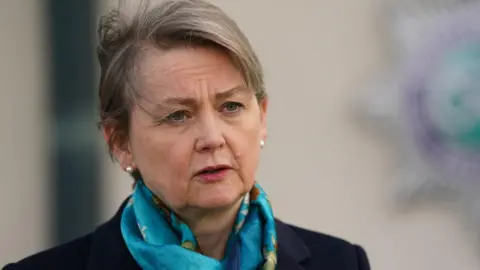In recent developments within the UK government, Home Secretary Yvette Cooper remains the only minister yet to finalize a funding agreement with the Treasury, just three days prior to the impending Spending Review scheduled for Wednesday. This critical budget-setting exercise is pivotal for determining the financial allocations for various government departments over the coming years. As the situation unfolds, significant tensions appear to surround the negotiations, particularly in relation to police funding, a matter that has now become a flashpoint in these discussions.
The pressure has escalated as other key ministers, like Housing and Communities Secretary Angela Rayner, have already struck deals with the Treasury, leaving Cooper in a precarious position. Reports indicate that these negotiations are not simply routine; they involve critical assessments of how to distribute limited resources across pressing public services, highlighting the intragovernmental disagreements that plague fiscal policymaking. It has been unveiled that themes surrounding public safety and police funding are particularly contentious between Cooper and Chancellor Rachel Reeves, as the government grapples with the need to balance financial prudence with the public’s demand for safety.
Peter Kyle, the Technology Secretary, added to the complexity by stating that the police must contribute to the broader reform of public services. During an appearance on the BBC program “Sunday with Laura Kuenssberg,” he underscored the widespread financial difficulties faced by various sectors, emphasizing the pressure on Chancellor Reeves from all quarters to secure additional funding. Despite assurances that the review would enhance spending for educational institutions and scientific research, Kyle did not shy away from indicating potential cuts to police funding, a stance that may further complicate Cooper’s negotiations.
The discussions regarding police staffing levels are particularly crucial; earlier communications indicated that ministers within the Home Office doubt that there are adequate resources available to meet the Labour Party’s pledge of recruiting 13,000 new police and community support officers—a commitment made in the party’s manifesto. Kyle defended the government’s prior financial support, announcing that an additional £1 billion had already been allocated to police funding, insisting on the need for law enforcement to engage in necessary changes moving forward.
The ongoing talks emerge at a time when every branch of the government is bracing for what promises to be a crucial week. Speculation persists concerning increased financial allocations for the National Health Service (NHS), as recent reports hint towards enhanced funding for the Department for Health. However, these potential increases are likely offset by tighter overall budgets for other government departments, as Chancellor Reeves seeks to adhere to her fiscal rules. These dictate that borrowing is not to be used for day-to-day expenditures, and that the national debt should diminish in relation to national income by 2029/30.
The Spending Review is expected to yield some revelations in the coming days, as the government recently disclosed an unprecedented £86 billion package aimed at advancing scientific and technological breakthroughs. This funding is specifically earmarked for innovative developments, including drug treatments and sustainable energy solutions like longer-lasting batteries. Additionally, there were announcements regarding the release of a £15.6 billion package meant to improve public transport systems across Greater Manchester, the Midlands, and the North East.
In his discussions, Kyle made it clear that while there is a commitment to creating 1.5 million new homes by the end of the Parliament, questions regarding budgetary security remained. The Labour government is portrayed as being focused and determined in its delivery of this housing agenda notwithstanding the looming pressures from budget constraints. A nuanced approach is being adopted in anticipation of the spending review, countering observations from institutions like the Institute for Fiscal Studies, which warns that slow growth rates demand necessary trade-offs are unavoidable.
As anticipation builds ahead of this major financial statement, the government’s intricate balancing act reflects broader economic challenges, highlighting the complexities of governing in an environment marked by fiscal prudence amidst public service demands. Cooper’s ultimate stance and outcome in securing a funding deal will not only affect policing but could also serve as a litmus test for Labour’s governance strategy moving forward.



